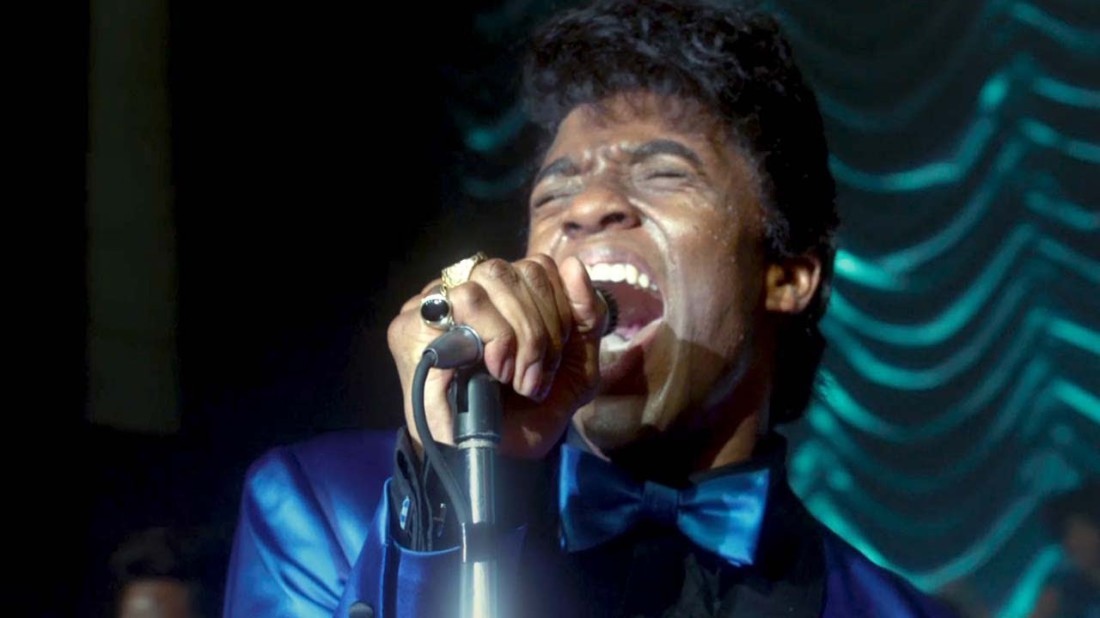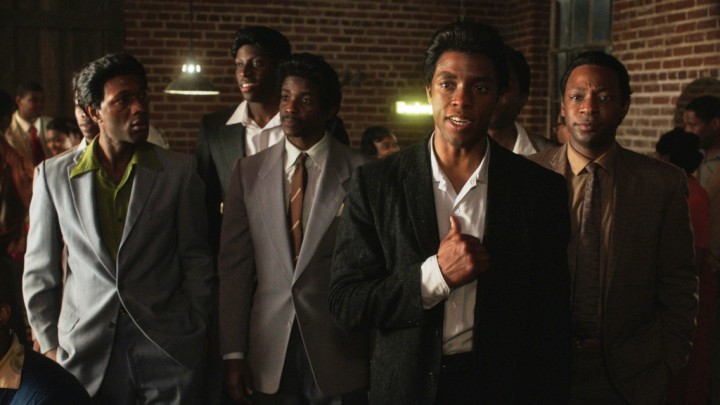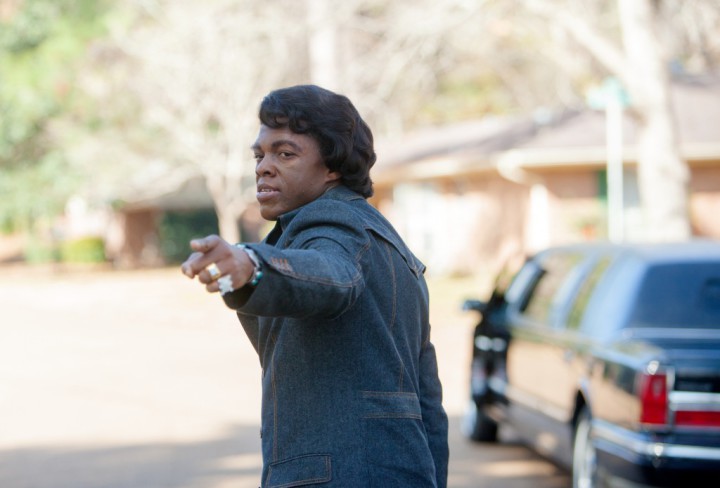Existing somewhere tucked inside the thin line between OK and wholly mediocre, Tate Taylor’s Get on Up is an interesting film wrapped around a pretty exhausted premise, a combination that ultimately creates one disappointing, frustrating whole. The film is a biopic of The Godfather of Soul, James Brown (here played by Chadwick Boseman, 42), and suffers from the general condition of simply being a biopic. The story can be too broad at times, and Taylor often loses focus and lets the film meander a bit too much towards the end, leading to an unwieldy 138-minute running time.
But there’s a curious byproduct to these inherent failings, in that Taylor seems to be fully aware of the problems of the worn-out nature of the biopic. To combat this, he throws every narrative device he knows against the wall, making for a much stranger, more interesting movie than one might expect from the director of The Help (2011). Get on Up opens in 1988, with a drug-addicted, velour tracksuit-wearing Brown, then quickly hops back to 1968, with Brown nearly dying on his way to a USO show in Vietnam. After this, we jump five years further into the past — but not before a momentary stop to an interview in the ’70s with Brown’s close friend Bobby Byrd (Nelsan Ellis, The Help) — and then all the way back to Brown’s impoverished childhood in 1930s Georgia. It’s an impressive feat of cinematic gymnastics that only picks up from there, since the movie never follows a linear narrative path, but rather an emotional one. It switches between eras (sometimes just for moments), often breaking the fourth wall with eccentric, bizarre yet erudite commentary from Brown, and occasionally falling into surreal fits of fantasy.
It’s all an attempt at peeling away the layers of Brown’s personality, a man who was at once a passionate performer and a heartless, driven businessman, constantly at odds with expectations of what he should be and white America’s social values. It’s a complicated look at the man — and one that doesn’t always work. Taylor doesn’t shy away from Brown’s shadier aspects (like domestic abuse), which is admirable as far as honesty goes, but removes much of the sympathy from Boseman’s charismatic portrayal (which is little more than an impersonation, but a damn good impersonation) of the man. That all of Brown’s complexities and foibles are supposed to be boiled down to a rough upbringing and a negligent relationship with his mother (Viola Davis) seems both wholly reasonable and unduly simplistic when placed within the framework of the plot. This makes the film’s ideas often feel muddled and unclear. Not helping things is the fact that the story can’t support its length, while Taylor’s bag of tricks is only so deep and can only go so far. Really, there needs to be a Ken Russell level of bombast to make this sort of thing truly transcendent cinematically. While Taylor’s made perhaps the year’s most curious mainstream release, it’s one that never quite pushes its way through to greatness. Rated PG-13 for sexual content, drug use, some strong language and violent situations.







Hanke starts the review as OK and mediocre but then jumps back and forth as worse as the stated narrative biopic of James Brown. He gave the movie 3 and half stars, but in reading his review, I’m clueless in knowing whether he liked the movie or not. That’s why in most cases I don’t read movie reviews. I thought the movie was extraordinary and Chadwick Boseman should be up for an Oscar. I’ve met James Brown. That being said, Boseman did not impersonate Mr. Brown, he was James Brown, right down to his hard to understand dialect.
I loved the back and forth narrative, which gave me a a true perspective of the many layers of James Brown. What could have been a convict turned into one of the world’s most beloved entertainers. How did a poor, uneducated kid, raised in the racially tense South of his era, become a savvy hardworking musical genius. I believe the story was told on the screen in a sometimes intense but relevant fashion. So In Mr. Brown’s words Mr Hanke, I think you should “hit it, then quit it” one more time before making such a poor judgement of this movie. If you want to see a biopic in a straight chronological narrative, then you’re a boring columnist who should go back to watching Turner Classics.
Mr. Hanke did not review this and has never seen it.